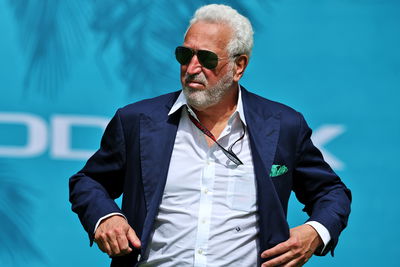I wouldn't change much, insists Symonds.
Renault F1's executive director of engineering Pat Symonds admits that hindsight is a wonderful thing when it comes to reviewing a grand prix season but, despite claiming that 2006 had been the hardest of his career in the top flight, he insists that there isn't much he would have done differently.
Renault F1's executive director of engineering Pat Symonds admits that hindsight is a wonderful thing when it comes to reviewing a grand prix season but, despite claiming that 2006 had been the hardest of his career in the top flight, he insists that there isn't much he would have done differently.
Although Fernando Alonso established a decent points lead over the opening few rounds of the year, as he had in his equally-successful 2005 campaign, Ferrari and Michael Schumacher made big enough strides in the closing stages to take the title fight to the wire in Brazil. Only a rare bout of bad luck appeared to prevent the German from retiring with an eighth world title, but Symonds admits that a couple of decisions taken by the Renault team earlier on could have prevented the stress he felt during the final three flyaway races.
"With the benefit of hindsight, I would make sure we redesigned the wheel nut mechanism before Budapest, not afterwards, and I would not have changed Fernando's front tyres in China," he said in an interview with the team's website, "Those two mistakes cost us two wins. But, in terms of our approach, our philosophy and how we went racing this year, I wouldn't change a thing.
"Our only rivals this year were Ferrari, and they have always enjoyed exceptional reliability. So managing our lead, or going conservative, was never an option. We had to go on the offensive. We knew that the level of performance of the Ferrari was similar to our R26 and that, most of the time, the differences came from differing tyre characteristics. There was no way of knowing, before the race weekend, if we would have the upper hand. And the balance of power between Michelin and Bridgestone could change literally overnight. That meant we needed to be adaptable in our approach."
Symonds, who worked with Schumacher during the German's Benetton days, admitted that winning back-to-back titles with Alonso and Renault was a major satisfaction, despite the team's progress appearing to be dogged by outside interference.
"The battle on track was tough, really tough," he admitted, "Our rivals didn't seem to have any weaknesses, or almost none, so we had to seize every little opportunity. And it was a difficult season politically, as well. It was hard to come to terms with events like the mass damper affair and Fernando's penalty in Monza."
Despite the setbacks allowing Ferrari to close the gap in both points tables, Symonds revealed that morale remained high at Renault.
"We worked very hard to keep everybody motivated," he explained, "We explained the situation to them, and made sure everybody remained confident. They were already world champions, and there was no reason why they could not do it again.
"To win a world title is always an honour for the people involved, but to do the same again the following year, with a double championship victory, is an achievement that really deserves recognition. It proves that the previous year's success was in no way lucky."










